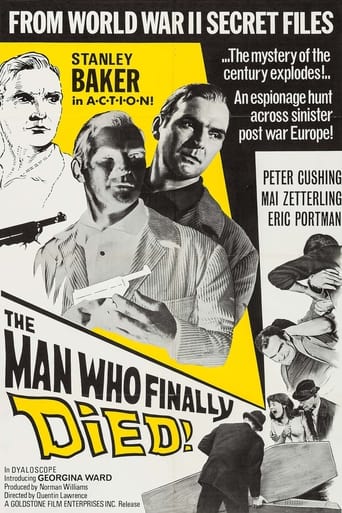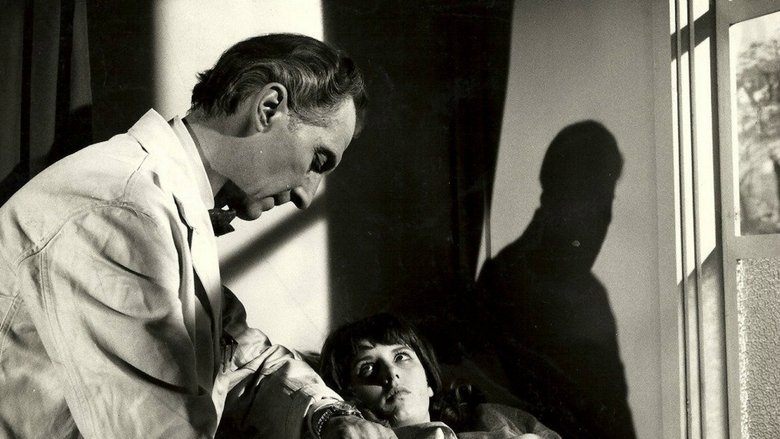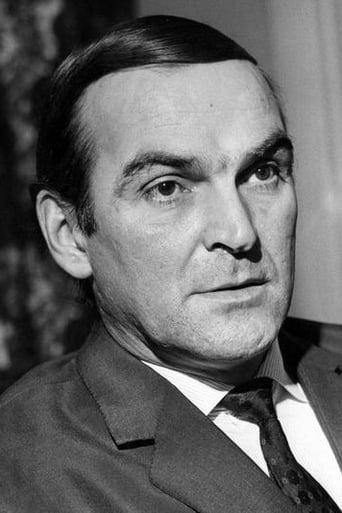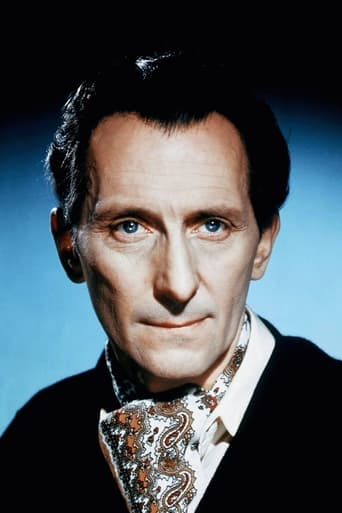The Man Who Finally Died (1967)
Joe Newman, a naturalised Briton, is telephoned by his German father, whom he believed long dead, at the same time as a funeral is taking place in Bavaria - with his father's name on the coffin. His investigation in Bavaria reveals startling facts and the obstruction he meets makes him suspect foul play.
Watch Trailer
Cast


Reviews
the leading man is my tpye
Admirable film.
There are better movies of two hours length. I loved the actress'performance.
This film is so real. It treats its characters with so much care and sensitivity.
2012:Allowing my copy of the delightfully bonkers Peter Cushing flick Corruption to play on after the credits,I caught an enticing 5 minutes from a TV showing of a Film Noir co-starring Cushing. Checking for the title online,I was disappointed to find no DVD,or even Video of it.2017:Finding out that UK DVD company Network were holding a flash sale,I rushed over to place an order. Preparing to order the enjoyable 1957 British Film Noir The Hypnotist,I was thrilled to see Cushing's Noir appear on the same page,which led to me finally seeing the man die.The plot:Receiving a mysterious call, London musician Joe Newman is told that the person speaking to him is his dad Kurt Deutsch,who died during WWII 20 years ago. Finding out that the call has come from a small Bavarian town,Newman leaves London for the town. Receiving a less than warm welcome, Deutsch is taken to the grave of Deutsch. Disbelieving what he sees, Newman goes to visit his mum Lisa Deutsch. Finding his mum to be living in the country home of Dr. Peter von Brecht,Newman begins to notice that Brecht and others in the town appear determined to keep Deutsch buried.View on the film:Finding the title from fuzzy TV showings,Network present a perfect transfer,with the soundtrack and the picture quality being pristine.Shot in the UK, director Quentin Lawrence & cinematographer Stephen Dade send Newman to an excellent, disorientating Film Noir town,where razor-sharp black and light low-shadows fill the space of the small population. Unearthing the truth about Newman's family with a quirky, spidery score by Philip Green, Lawrence slants the paranoia on Newman with ultra-stylised pans across to strangers with an eye on his search,against a washed-out sky that rains an eerie atmosphere on Deutsch's grave.Based on a 7-part British mini-series, (sadly not seen since airing in 1959)the screenplay by Lewis Greifer and Louis Marks adapt the show into a tightly coiled stranger in a strange land Film Noir,as Newman's determination to dig up the secrets of the town leads to brash confrontations with locals who want the truth kept six feet under. Whilst openly borrowing from The Third Man a number of times,the writers compose an excellent, distinctive tone that tracks the revelation of the ending to the post-WWII pessimism of Film Noir,with Newman's discovery crossing the WWII isolation that haunts the town, with the shivering terror of the Cold War.Kicking the cobblestones lining the town to the side, Stanley Baker gives a terrific performance as Newman,who Baker gives a Film Noir loner thirst to uncovering the truth about his dad,while legendary character actors Eric Portman,Nigel Green and Brian Wilde listen in on his paranoid questions. Hovering above Mai Zetterling's withdrawn widow Lisa, Peter Cushing gives a great performance as Brecht,that Cushing brims with a horror ambiguity over what Brecht knows about the man who finally dies.
A man prompted by a phone call returns to Germany where he was born in search of his father whom he had supposed dead. But is he? The film answers the question but in a talky, pedestrian way. There are twists and turns towards the end that perk up the film but mostly it is unexciting which is a shame as it had lots of potential. The music score tries to be thrilling but becomes laughably over intense. Stanley Baker gives a one note performance, Eric Portman gives a strange performance and Mai Zetterling doesn't do much. Peter Cushing is good as always as an ambiguous doctor, Nigel Green as a taciturn policeman is scary and Niall MacGinnis steals the film as an insurance investigator. Familiar players like Alfred Burke and Brian Wilde have minor but effective roles.The best thing is the sparkling black and white photography and the accomplished use of the widescreen format.
The problem with this film is that there is just much talk.Furthermore the pace is almost find real.Everything is an unexplained mystery,even why Stanley Baker,,with an eye complaint keeps on putting on and taking off his dark glasses.Some of the characterisation seem strange to say the least.Eric Portman plays the local police detective as if he was a member of the Gestapo.You expect him to order Nigel Green to give Stanley the once over with a piece of rubber hose.There is so little explanation of exactly what has happened that you struggle to make any sense of the film.The music tends to be far too intrusive.It is rather frustrating not to be able to understand the plot till the last 10 minutes.However even then the motivation of the characters remains unclear.
Nothing is as it seems in "The Man Who Finally Died". Figures of evil turn out to be forces of good, and vice versa. Questions with a supposedly limited number of answers turn out to have more alternative outcomes. And even the hero himself is conflicted about his own identity (he was born German, but is now a British citizen). There is an interesting post-WW2 moral complexity to this film, which is also helped by atmospheric black & white photography and a classy supporting cast. The hero is (understandably) a pretty grim guy, but his few jokes score bigtime (when a hotel maid asks him why he wears his sunglasses inside his room, he responds: "I got a bit of dirt in my eye....when I was a boy"). Perhaps my only main objection has to do with the music score, which is sweeping but sometimes overemphatic. Nevertheless, this is an overlooked film that deserves more attention. **1/2 out of 4.








